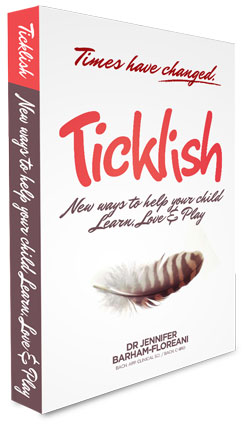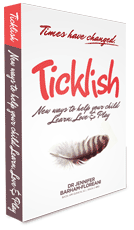“I am thankful for laughter, except when
milk comes out of my nose.” —Woody Allen
 Don’t you hate that – when someone makes you laugh when you are eating or drinking? Having a good sense of humour though, even in moments like these, helps us to keep life in perspective. In fact laughing is a great remedy for stress, anxiety and a host of other things and I talk about it a lot in my new book Ticklish, which is just about to be released.
Don’t you hate that – when someone makes you laugh when you are eating or drinking? Having a good sense of humour though, even in moments like these, helps us to keep life in perspective. In fact laughing is a great remedy for stress, anxiety and a host of other things and I talk about it a lot in my new book Ticklish, which is just about to be released.
According to Dr William Fry, associate professor of clinical psychiatry at Stanford University, who has studied the effects of laughter for 30 years, laughter increases the heart rate, improves blood circulation and works muscles all over the body. Fry compares laughter to “inner jogging” and claims that laughing 100 times a day is the equivalent of ten minutes of rowing.1 That’s a lot of laughing!
The point here is — a good time to laugh is whenever you can!
In Humor: Its Origin and Development,2 the author suggests that when used skillfully, humour in therapy can:
- Create a more relaxed atmosphere
- Encourage communication on sensitive matters
- Be a source of insight into conflict
- Help overcome a stiff and formal social style
- Facilitate the acting out of feelings or impulses in a safe, non-threatening way
These are wonderful points to consider, particularly with our parenting. Having a playful relationship with our children (free of sarcasm) promotes connection and feelings of safety, allowing us to be spontaneous and lighthearted. Laughter connects us with loved ones—label or no label. In fact, for developmentally challenged children, laughter is critical and there are many important physiological responses that are caused by laughter.
The ‘Feel Good’ Factor
Laughter is credited with increasing the release of endorphins, a ‘feel good’ hormone which is the body’s natural painkiller and protector against depression. Although the physiology of laughter and play are far from understood, we do have good reason to believe that the secretion of endorphins in the brain affects virtually every system of the body including, of course, our behaviour.3 When endorphins are low, people feel anxious and they are also more aware of pain.
Clinical studies have shown that laughter decreases serum cortisol levels, increases T lymphocytes and increases the number of natural killer cells. Put simply, these results suggest that laughter decreases stress hormones and stimulates the immune system.4
In paediatric hospital settings, unlike adult care, the use of humour has typically not been limited to patients with specific diagnoses; rather it has been used for all ages and stages of children and youth, regardless of the nature of their illness or reason for hospitalization because it has been found to be so beneficial.
Just for interest’s sake…
People with low endorphin levels often have an appetite for fat and fatty foods, such as chips, cheese, chocolate, creamy sauces, margarine, butter and fried chicken, for example. After eating some fat, they will notice a change in mood, feeling more pleasure due to the release of endorphins. Exercise, by releasing fat from within the body, also raises endorphins and causes the same mood changes. (5) Isn’t knowledge powerful? Next time you feel like eating fatty, nutritionally poor foods, choose to go for a run or a brisk walk instead. An effective way to beat cravings!
Here are a few quotes that make me laugh…
“Even if there is nothing to laugh about, laugh on credit.”
—Author Unknown“Dad always thought laughter was the best medicine,
which I guess is why several of us died of tuberculosis.”
—Jack Handey“When people are laughing, they’re generally not killing each other.”
—Alan Alda“Whoever said “laughter is the best medicine” never had gonorrhea.”
—Kat Likkel and John Hoberg“Seven days without laughter makes one weak.”
—Mort Walker“Laughter is a tranquilizer with no side effects.”
—Arnold Glasow“Laughter is an orgasm triggered by the intercourse of sense and nonsense”.
—Author Unknown“We do have a zeal for laughter in most situations, give or take a dentist.”
—Joseph Heller
Laughter, learning, love & play for your children’s development
My new book Ticklish discusses many new, simple, proven, research-based ideas for you to help your child learn, love and play, so that they thrive in today’s challenging environment and express their full potential. A healthy dose of laughter is certainly one of those great, simple ideas to help your child thrive — and can be easily ignited through something as simple as tickling.
The ‘tickle response’ is mostly pure joy and vivacity…
…and this is our goal as loving parents.
Ticklish covers a broad spectrum of topics, including:
— 23 ways to help your child’s brain develop
— Milestones for the new millennium child
— Power to parents
— Why doesn’t my child seem to be quite right?
— Coping with ADHD, Autism, Asperger’s Syndrome and companion disorders
— And much more…
For more information about Ticklish, please visit: www.TicklishBook.com
So remember: a good time to laugh is . . . whenever you can!
. . .
2) In Humor: Its Origin and Development. McGhee, P. Freeman Pty.(1979).
3) Growing young, laughter, play and other life giving basic behavioral needs. Montague, A. (1991). An address to the Power of Laughter and Play Conference, Institute for the Advancement of Human Behavior, Stanford, CA.
4)Berk, L. (1989) Neuroendocrine and stress hormone changes during mirthful laughter. American Journal of Medical Sciences, 298(6), 390—396
5) Full and Fullfilled. The Science of Eating to Your Full.Nan Allison and Carol Beck. 2000. AB Books Nashville, TN 37204

Take a look at Jennifer’s new book!
Ticklish — New Ways to Help
Your Child Learn, Love & Play




